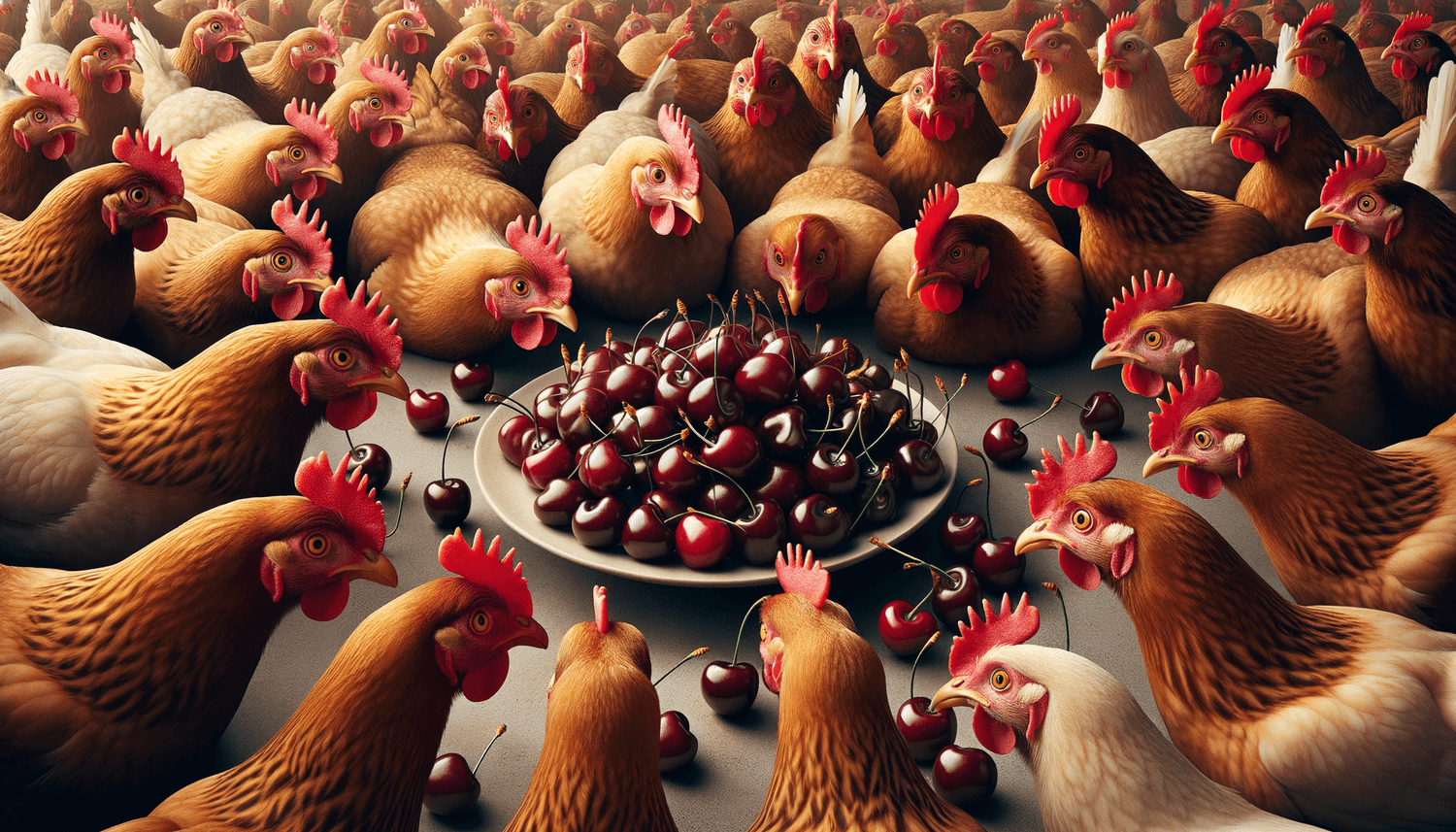Well, hello there, feather-raising friends! Summer is here, and it’s raining cherries—literally! As you munch on those sweet and juicy morsels, have you ever wondered if your clucking companions can join you in the cherry pit party? Fear not, in today’s post we’ll dig into the great cherry pit debate, discuss the importance of a balanced chicken diet, and reveal the benefits and risks of these mysterious little seeds. Plus, we’ll even share tips on how to prepare this scrumptious treat for your beloved backyard flock. So, let’s get cracking—or should we say ‘pitting’?
Can chickens eat cherry pits?
No, chickens should not eat cherry pits, as it is not safe for them. Cherry pits contain a compound called amygdalin, which breaks down into hydrogen cyanide when ingested. Consuming cherry pits can put your flock at risk of cyanide poisoning, which is highly dangerous and can be lethal for your feathered friends.
Chickens need a balanced diet too
Just like us humans, our clucking compadres need a well-rounded and balanced diet to live their healthiest and happiest lives. What goes into a chicken’s balanced diet, you might wonder? The answer lies predominantly in high-quality chicken feed.
A solid foundation for a chicken’s diet should consist of about 80-90% chicken feed, ensuring that they’re getting all the essential nutrients, vitamins, and minerals necessary for growth, strong egg production, and a healthy immune system. The remaining 10-20% of their diet can include a variety of treats—think fruits, vegetables, and even some nutritious table scraps to keep things fun and interesting for your feathery friends!
Nutritional value of cherry pits for chickens.
As we previously established, chickens should not eat cherry pits due to the presence of amygdalin, a compound that breaks down into hydrogen cyanide when ingested. This puts your flock at risk of cyanide poisoning, which is highly dangerous and can be lethal. Because of this risk, the nutritional value of cherry pits for chickens becomes irrelevant, as they should not consume them in the first place.
It is important to focus on providing your chickens with safe and healthy treats, such as fruits, vegetables, and other foods that are known to supply essential nutrients without posing a threat to their well-being. By ensuring that your chickens are only offered suitable treats, you are setting them up for optimal health and reducing the risk of illnesses or complications that may arise from consuming hazardous foods, like cherry pits.
Nutrition table of cherry pits for chickens.
| Information | Description |
|---|---|
| Nutritional Value | Not applicable, due to potential cyanide poisoning |
| Suggested Serving Size | Chickens should not eat cherry pits |
| Safe Feeding Practices | Do not feed cherry pits to chickens |
| Preparation | Not applicable, as cherry pits should not be fed to chickens |
| Potential Risks | Cyanide poisoning, which is highly dangerous and can be lethal |
| Hydration | Not applicable, due to potential cyanide poisoning |
| Digestion | Not applicable, as chickens should not consume cherry pits |
| Seasonal Availability | Cherry pits are generally available during cherry harvesting season, however they should not be fed to chickens |
| Other Benefits | Not applicable, due to potential cyanide poisoning |
Safe alternatives for chicken treats
Now that we’ve established that cherry pits are a no-go for your flock, let’s explore some safe and nutritious alternatives for chicken treats. Some fruit and vegetable options that pack a healthy punch for your chickens include leafy greens, berries, watermelon, bananas, and apples (without the seeds).
When feeding treats to your chickens, remember to keep the quantities in moderation. Treats should complement, not replace, the primary nutrition from their chicken feed. Overfeeding treats can lead to obesity, poor egg production, and other health issues in your flock.
Developing a feeding schedule
To maintain a healthy and balanced diet for your backyard chickens, it’s important to have a consistent feeding schedule. Offering chicken feed in the morning and evening, and providing nutritious treats during the day can keep your flock energized and satisfied.
Make sure to have clean water available at all times, as chickens can drink up to a pint of water per day. Regularly inspecting and cleaning your chickens’ water source will help prevent water-borne diseases and infections.
Cherries for chickens – without the pits
While cherry pits are dangerous for chickens, the fruit itself can be a delightful and nutritious treat when properly prepared. As long as the cherries are pitted, you can serve them to your chickens as a tasty summertime treat full of vitamins, minerals, and antioxidants.
When incorporating cherries into your chicken’s diet, always thoroughly wash and remove the pits before serving. Keep the servings moderate, so as not to disrupt their balanced diet. Now your feathered friends can enjoy the sweet taste of summer too!

















